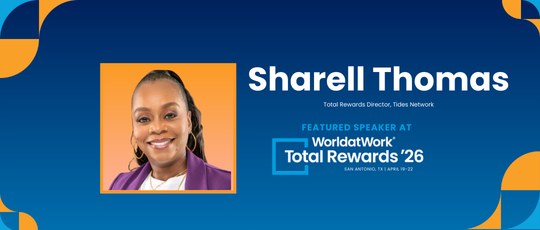For WorldatWork Members
- The What, How and Why of Performing a Cost-Benefit Analysis, Workspan Daily Plus+ article
- The Role of Total Rewards in Managing Change Fatigue, Workspan Magazine article
- Conquering Change Fatigue, Workspan Magazine article
- Comp Talk 101: Training Managers to Communicate Pay Decisions, Workspan Magazine article
For Everyone
- The ‘Salary Squeeze’: How the Workforce Is Weighing Compensation, Workspan Daily article
- Mercer Report Shows Actual Salary Increases Less Than Anticipated, Workspan Daily article
- ‘Year of Contention’: Employers Mull Tight Budgets, Pay Expectations, Workspan Daily article
- Employers Should Consider Long-Term Effects Before Dropping Benefits, Workspan Daily article
A majority (56%) of U.S. and Canadian employers indicated their workers are concerned about base pay increases due to recent global financial factors, according to
research by consulting firm WTW. While many organizations that participated in the “Adapting to 2025 U.S. Policy Shifts Pulse Survey” said workers don’t need to worry about any immediate changes to salary increase budgets, some do expect tariffs, trade wars, governmental policy changes and other economic conditions to reduce their planned raises and incentives this year or next year.
Access a bonus Workspan Daily Plus+ article on this subject:
The economic uncertainties facing workers are significant:
- 43% of employees surveyed by the Society for Human Resource Management (SHRM) said inflation had an extreme or significant impact on their personal finances in 2024, and 46% were concerned about inflation’s impact on the value of their compensation.
- WTW’s recent “Global Benefits Attitudes Survey” found one-third of polled workers are financially worse off today than they were a year ago. Notably, almost 90% are worried about covering basic living expenses — even if they believe their compensation is fair.
- And, while 75% of employers surveyed by financial and insurance company Prudential believe their benefits help with retirement savings, only 35% said those benefits help with everyday expenses and real-time financial stressors.
With financial fears mounting and employee confidence remaining low, many workers are looking to their employers for assistance.
What Are Workers’ Expectations Today?
Almost 60% of employees that participated in WTW’s “Global Benefits Attitudes Survey” listed financial well-being as their top priority for employer benefits and assistance in the near future, and 43% said they want their employers to help them with growing their savings and wealth, said Jessica Dahl, the company’s director of employee experience.
“While employees may rationally understand their employer’s decisions, the emotional weight and burden [of financial concerns] can cause distractions and a strain on focus, productivity and employees’ ability to drive impact for their organization,” she said. “This is not a time to let up on an intentional focus on the employee experience.”
That message is particularly timely given the disconnect between what workers say they expect or need and what organizations are providing. Consider:
- HR professionals recently listed leadership and manager development as their top priority for 2025, while workers were most focused on total rewards, according to the SHRM research.
- 98% of employees said they need a cost-of-living adjustment in 2025, but about a quarter of them did not receive one in 2024, SHRM found.
- 86% of employers believe their benefits are modern, but only 59% of workers agree, according to the Prudential report.
“That’s a big disconnect, but also a big opportunity for employers,” said Christina Pihos, the chief marketing officer at Prudential.
Are Employers and Employees Aligned?
HR and total rewards (TR) professionals are aware of employees’ concerns and shifting expectations, according to SHRM’s report, but they also shared that the same economic uncertainties plaguing workers’ personal finances are resulting in tighter salary and benefit budgets.
Many employers implemented creative benefit program expansions and increased pay in recent years to competitively attract talent, but the dynamics in today’s labor market are different, said Allison Vaillancourt, a vice president in the organizational effectiveness practice at Segal, an HR and benefits consulting firm. She noted compensation packages are often contracting rather than expanding these days, and “employee expectations may no longer match current economic realities.”
As to concerns about the effects of tariffs on salary increases, almost one-quarter (23%) of participating organizations in WTW’s “Policy Shifts” study said they anticipate lower-than-planned pay increases this year due to tariffs and continuing economic volatility. Another 48% of organizations said current economic factors will not interfere with this year’s projected salary increases — however, next year’s salary budgets likely would be affected. Twenty-eight percent predicted no impact on salaries this year or next.
Variable pay is being measured as well. WTW found:
- 72% of organizations do not have plans to modify their long-term incentive plans.
- 67% have no plans to modify their short-term incentive plans.
- 28% would consider discretionary adjustment this year, if needed.
- 19% would consider changes at the end of the performance cycle, if needed.
- 11% have already made a change or are planning one.
How to Strike the Right Balance
Where does this leave employers that may be tightening benefit and salary increase budgets during a time when pay expectations and financial concerns are increasing?
First, look at potential adjustments to non-pay components of the total rewards package, said Pihos, noting that Prudential’s study found 68% of employers anticipate making some change in their suite of employee benefits over the next two years.
“Compensation alone isn’t the only lever — and in many cases, it’s not the most flexible one,” Pihos said. “When budgets are tight … employers can strike the right balance by doubling down on benefits that reduce real-life pressures. Companies that meet employees where they are, even during tough times, are the ones most likely to retain top talent and emerge stronger.”
While financial stress is a leading employee concern, Prudential’s report found workers are also looking for flexibility, mental well-being support and paid time to care for family, pets and themselves — all of which offer opportunities for employers, Pihos said.
When needing to make potentially unpopular decisions about pay and benefits, it’s even more vital to communicate openly and regularly with workers about challenges the business is facing and the thought process behind those decisions, said Megan Yost, the head of thought leadership and insights at Segal.
She urged TR pros to educate employees on benefits and resources available to them that may help fill financial gaps, and to remind them about options available to them in difficult times, such as their ability to update their benefits outside of the annual open enrollment period if their partner or spouse loses their job.
“Periods of uncertainty are often make-it-or-break-it moments for leaders and managers, so it’s important that leadership communicates more regularly instead of less, even if they don’t have all the answers to employees’ questions,” Yost said.
Through total rewards optimization, collaborative change management and thoughtful communication campaigns, organizations can strike a balance between managing costs and fortifying the employee experience, rather than being forced to choose between the two, WTW’s Dahl said.
“Transparency doesn’t necessarily mean a broad announcement that there are no pay increases — it’s about reframing the narrative,” she said. “While salary increases are declining, actual salaries are not changing. Reminding employees that the organization is committed to providing them with competitive pay that reflects the market for their industry and roles as well as the individual’s competencies is a good re-education moment.”
Editor’s Note: Additional Content
For more information and resources related to this article, see the pages below, which offer quick access to all WorldatWork content on these topics:








